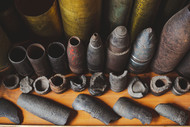Common Myths and Facts About Ammunition
Posted by Phantom Defense on Aug 5th 2024
Introduction
Ammunition is a critical component for firearms, but many myths and misconceptions surround it. Understanding the truth about ammunition can help you make informed decisions and enhance your shooting experience. In this article, we will debunk common myths and present the facts about ammunition.
Myth 1: All Ammunition Is the Same
Fact: Different Ammunition for Different Purposes
Contrary to popular belief, not all ammunition is created equal. Ammunition is designed for specific purposes such as hunting, target shooting, and self-defense. Full metal jacket (FMJ) rounds are ideal for target practice due to their accuracy and cost-effectiveness, while hollow points are preferred for self-defense due to their expansion upon impact.
Myth 2: Hollow Points Are Illegal
Fact: Legalities Vary by Jurisdiction
Hollow point ammunition is not universally illegal. While some states or localities have restrictions on their use, hollow points are legal in many areas for self-defense purposes. Always check your local laws and regulations before purchasing or carrying hollow point ammunition.
Myth 3: Ammunition Has an Expiration Date
Fact: Proper Storage Extends Shelf Life
While ammunition doesn't have a strict expiration date, its performance can degrade over time if not stored properly. Keeping ammunition in a cool, dry place can significantly extend its shelf life. Properly stored ammunition can remain reliable for many years.
Myth 4: Steel-Cased Ammo Is Inferior
Fact: Steel-Cased Ammo Has Its Uses
Steel-cased ammunition is often perceived as inferior to brass-cased ammo. While it may not be reloadable and can be harder on the firearm's extractor, it is generally more affordable and functions well in many firearms. It's a viable option for budget-conscious shooters.
Myth 5: You Can Use Any Ammo in Your Firearm
Fact: Match Ammo to Your Firearm
Using the wrong type of ammunition can be dangerous and cause damage to your firearm. Always use ammunition that matches the caliber specified by the firearm manufacturer. Refer to your firearm's manual to ensure compatibility and safety.
Myth 6: Lead Bullets Are Obsolete
Fact: Lead Bullets Are Still in Use
Despite advancements in ammunition technology, lead bullets are still widely used, particularly for target shooting and hunting. They are affordable and offer reliable performance. However, non-lead alternatives like copper bullets are available for those concerned about lead exposure and environmental impact.
Myth 7: More Powerful Ammo Is Always Better
Fact: Power Needs Vary by Application
More powerful ammunition is not always better. The appropriate power level depends on the intended use. High-velocity rounds may be suitable for long-range shooting, while lower-velocity rounds may be preferred for self-defense to minimize over-penetration risks.
Myth 8: Ammunition Is Waterproof
Fact: Most Ammo Is Water-Resistant, Not Waterproof
While some ammunition is designed to be water-resistant, few types are entirely waterproof. Exposure to moisture can degrade the powder and primer, affecting performance. Store ammunition in a dry environment and use waterproof containers if necessary.
Myth 9: Ammunition Causes Firearms to Wear Out Quickly
Fact: Quality Ammo Minimizes Wear
Using high-quality ammunition appropriate for your firearm helps minimize wear and tear. Poorly manufactured or incorrect ammunition can cause excessive wear and damage. Regular maintenance and using reputable brands ensure the longevity of your firearm.
Myth 10: Reloaded Ammo Is Unsafe
Fact: Safe When Done Correctly
Reloading ammunition can be safe and cost-effective when done correctly. Following proper procedures and using quality components are crucial. Many experienced shooters reload their ammo without issues, but it requires knowledge and attention to detail.
Conclusion
Understanding the myths and facts about ammunition is essential for making informed decisions. By debunking common misconceptions, you can enhance your shooting experience, ensure safety, and choose the right ammunition for your needs.

